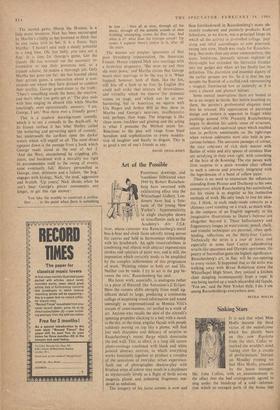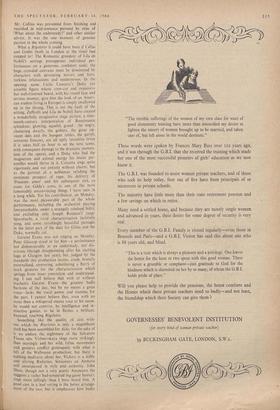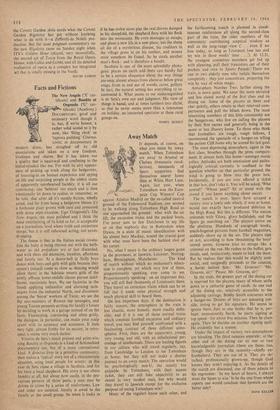Sinking Stars
IT is said that when Miss Moffo became the third victim of the maledizione which has plainly been on this new Rigoletto from the start, Callas re- marked she wouldn't mind `taking over for a couple of performances.' Instead,
on Monday evening we
fjj had Miss Moffo, preceded
by the house manager, Mr. John Collins, with an announcement to the effect that• she had courageously agreed to sing under the handicap of a cold—informa- tion which so enraged parts of the house that
Mr. Collins was prevented from finishing and vanished in mid-sentence- pursued by cries of
`What about the understudy?' and other similar advice. It was the one moment of genuine passion, in the whole evening.
What a Rigoletto it could have been if Callas and Gobbi (both in London at the time) had
stepped in ! The Romantic grandeur of Lila de Nobili's settings presupposes individual per- formances on a generous, confident scale; the
huge. crowded canvases must be dominated by characters with devouring terrors and lusts, reckless infatuations and tendernesses. In the opening scene Carlo Cossutta's Duke (an amiable figure whose crew-cut and expansive but well-trimmed beard, with his round face and serious manner, give him the look of an Ameri- can student living in Europe) is simply swallowed up in the throng. This is not the fault of the setting; Zeflirelli and Lila de Nobili have created a wonderfully imaginative stage picture, a nine- teenth-century interpretation of Renaissance . splendour, glowing, squalid, grand : the angry, chattering dwarfs, the goblets, the great up- swept dais and the banquet tables. the garish, sensuous frescoes, are all aptly inventive (even if it takes half an hour to set the next scene, with consequent damage to the dramatic momen- tum of the opera), and a Duke who had the magnetism and animal energy his music per- sonifies would thrive in it. Cossutta sings quite vigorously and not entirely without charm; but as the portrait of a nobleman relishing the imminent prospect of rape, his delivery of 'Possente amor' and his subsequent exit, en route for Gilda's arms, is one of the most lamentably unconvincing things I have seen in a long while. Yet his contribution, on Monday. was the most pleasurable part of the whole. performance, including the orchestral playing (unremarkable, under a strangely subdued Solti), and excluding only Joseph Rouleau's rangy Sparafucile, a vivid characterisation incisively sung, and some ravishingly, beautiful passages in the latter part of the duet for Gilda and the Duke, normally cut.
Geraint Evans was not singing on Monday. Peter Glossop stood in for him—a performance not dishonourable in an understudy, not dis- atrous (though disappointing after his exciting lago at Glasgow last year), but, judged by the standards this production invites, crude, brutally externalised, unmoving, substituting a flurry of stock gestures for the characterisation which springs from inner conviction and understand- ing. I can well believe that with or without tracheitis Geraint Evans—the greatest buffo baritone of the day,. but by no means a great voice—lacks the vocal 'power and stamina for the part. I cannot believe that, even with no more than a whispered mezza voce to his name, he would not contrive, by intelligence and in- stinctive genius, to be in flashes a brilliant. haunted, touching Rigoletto.
Something like the quality of cast with- out which the Rigoletto is only a magnificent shell has been assembled for Aida; for the sake of it we endure the nightmare of the Salvatore Fiume sets. Vishnevskaya sings more strikingly than movingly and her wild, feline movements and gestures conflict grotesquely with what is left of the Wallmann production; but there is 'lathing mediocre about her. Vickers is a noble and stirring Radames, Simionato an Amneris still unsurpassed in style and authority. John Shaw, though not a very poetic Amunasro (he suggests a rather bad-tempered big-game hunter). sings more tellingly- than I have heard him. A good cast in a bad citing is the better arrange- ment of the two, but it emphaNi,es how badly
the Covent Garden Aida needs what the Covent Garden Rigoletto has got without knowing what to do with it—a Zeffirelli-de Nobili pro- duction. But the most poignant commentary on the new Rigoletto came on Sunday night when ITV's Golden Hour relayed, very successfully, the second act of Tosca from the Royal Opera House, with Callas and Gobbi, and all the detailed realisation of opera as a complex but integrated art that is totally missing in the Verdi.
DAVID CAIRNS




































 Previous page
Previous page